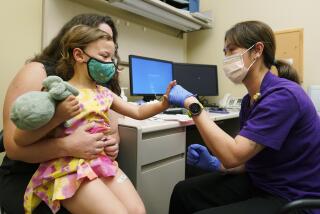Op-Ed: Is treating a sick child always the best course?
- Share via
“Cure sometimes, treat often, comfort always.”
Hippocrates, the father of Western medicine, imparted this wisdom to doctors more than 2,000 years ago. Today, as a pediatric resident at a top academic hospital, I find myself wondering whether, in our eagerness to treat and to cure, we’re losing sight of our responsibility to comfort.
The patient who got me thinking about this was a boy I’ll call Michael, to protect his privacy.
Michael’s life was hard from the start. Born three months prematurely to parents who felt unable to care for a baby with such overwhelming medical needs, Michael entered the foster care system before he left the hospital. At 1 month old, as those in charge of his care tried to find a foster family that could meet his needs, Michael developed a severe infection in his gut, which led to multiple surgeries and left him with very little functioning intestine.
A foster family was found, but when they learned that Michael was likely to need intestine, liver and pancreas transplants, the family felt unable to handle Michael’s medical needs, so he was moved again. That is when he landed in UCLA hospital’s pediatric ward, a very sick baby without a home. The medical staff fell in love with him.
Over the next 12 years of his life, Michael spent a lot of time at UCLA. He had three organ transplants, and then another three after his body rejected the first round. He was hospitalized again and again with infections and missed years of school. When not in the hospital, he lived with many different families until he was finally adopted by his last set of foster parents when he was 5 years old.
The hospital staff was so happy about the adoption. He finally had parents he loved and was loved by. I saw his face light up when he talked about his new family and the fun they had together. He was enthusiastic about his new school and new friends in Northern California. It appeared that Michael had finally achieved the happiness he so clearly deserved.
I still remember the call from one of my co-residents: Michael, now 12, was back in the emergency room at UCLA, and it wasn’t good. He was in the midst of another rejection crisis, bleeding from his rejected organs at a faster rate than we could transfuse blood back into him. It was decided to remove his intestines and pancreas from his abdomen and sustain him on IV nutrition. He was admitted to the hospital.
Michael’s life in the hospital was a struggle. He could not eat anything by mouth, and he begged us for Cheetos, for pizza, for water. I was heartbroken every time I had to tell him no. His parents lived more than six hours away and had many other children at home, as well as jobs they needed to keep in order to pay for Michael’s hospital bills. Their visits became less frequent, and I choked back tears when I saw Michael kiss a picture of his parents good night before going to bed alone in his hospital room. As the months dragged on, I watched Michael become sad, then angry, withdrawn and spiteful. He was labeled a “difficult patient,” and nurses were warned not to go too close because he might hit.
We doctors desperately wanted him to get better so he could return to his family and to school and play outside with his friends. We soberly assessed the numbers: He had a 30% chance of survival if he received another set of organs, a 20% chance of living long enough to receive those organs, an 80% chance that he would go into kidney failure before receiving the new organs. But we didn’t ask ourselves the most basic question of all: Was it time to provide comfort rather than treatment?
Michael was miserable, and the odds were stacked against him. But no one stopped to offer him the option to go home and live out his remaining days with his family. If we’d done that early enough, he might have been able to go to Disneyland, to Legoland, to the ocean. He would not have lived long without a new set of organs, but would a short life lived well have been better for him than endless dark and uncertain days in the hospital?
At 13, after 13 months in the hospital, Michael died in the pediatric ICU before getting the organs he was listed for. When I received the email telling me he’d died, I was devastated, and not simply because this beautiful boy was no longer with us; that had been the likelihood all along. The deeper pain was knowing that he’d been denied the quality of life that he so deeply deserved. Were we responsible for robbing him of happiness in our desire to cure him? Did we forget our highest responsibility to comfort always?
Sarah Maufe is a resident physician in pediatrics at UCLA.
More to Read
A cure for the common opinion
Get thought-provoking perspectives with our weekly newsletter.
You may occasionally receive promotional content from the Los Angeles Times.






